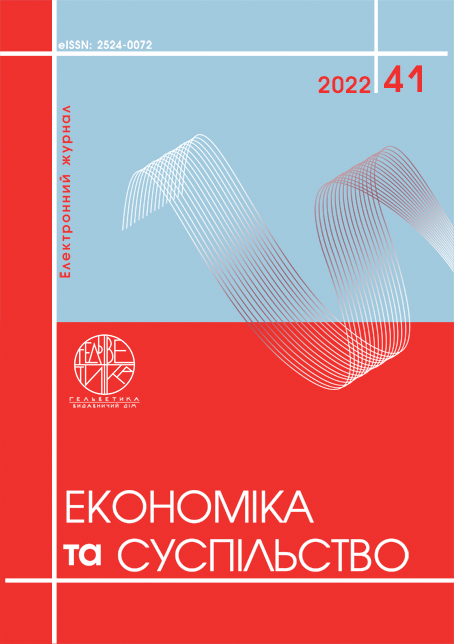CORPORATE CULTURE AS A FACTOR FOR FORMING THE SUCCESS OF THE UKRAINIAN BUSINESS ENVIRONMENT ON THE WAY TO EUROPEAN STANDARDS
Abstract
The article examines the specifics and principles of functioning of the modern business environment and its business culture, an important component of which is a new form of organizational culture – corporate culture, in the context of the methodology of philosophical and cultural analysis. Corporate culture is studied as a modern socio-cultural phenomenon that reflects the leading trends in the development of the global economy and digital technologies. The article examines the system of value bases that defines corporate culture as a culture of a new type of organization, and as a new form of business culture, and as a new level of management, based on the promotion of human capital as the main asset of any organization. Special attention is paid to the attribute component of the value core of the organization's corporate culture in the conditions of digital realities, which is expressed primarily in the system of modern branding. In the era of digital technologies and globalization of the market, the economy of each individual country is already only a part, only a component of a single global economic system. At the same time, the partnership is considered by specialists as the main type of economic relations, which replaces such former forms of expansion of companies' activities as mergers, acquisitions, coercion, control, etc. issues related to the meaning of business culture, the place and role of corporate culture in its structure become especially relevant and should become the subject of a special analysis. In the era of digital technologies and globalization of the market, the economy of each individual country is already only a part, only a component of a single global economic system. At the same time, experts consider partnership as the main type. The study of corporate culture precisely as an intellectual asset of a modern enterprise only partially takes place in the works devoted to the study of the total set of intellectual assets of the organization. All this allows us to state that the problem considered in this work is practically unstudied, which, in turn, provides a wide field of activity for its further research.
References
Линн Л. Личный бренд. Позаботьтесь о вашей репутации прежде, чем это сделают другие. Москва : Азбука Бизнес; Азбука-Атткус, 2014. 157 с.
Питерс Т. Преврати себя в бренд: 50 верных способов перестать быть посредственностью. Москва : Манн, Иванов и Фербер, 2013. 240 с.
Богатырева М.Р., Егорушкова Ю.И. Методика формирования и поддержания корпоративной культуры. Экономика и бизнес: теория и практика. 2020. № 1–1(59). С. 43–45.
Формирование отличной корпоративной культуры и повышение конкурентоспособности предприятия. Jrdjw.com. URL: http://www.jrdjw.com/old-version//a/qiyedangjian/2012/0331/2486.html (дата звернення: 18.07.2022).
Кузьмін О.Є., Бала О.І., Бала Р.Д. Фактори впливу на корпоративну культуру: сутність та класифікація. Економіка: проблеми теорії та практики : Збірник наукових праць. Випуск 222: в 5-ти т. Т. 5. Дніпропетровськ : ДНУ, 2007. С. 1078–1083.
Прищак М.Д., Лесько О.Й. Етика та психологія ділових відносин : навчальний посібник. Вінниця : ВНТУ, 2015. 144 с.
Васильченко М.І, Гришко В.В. Комунікативний менеджмент : навчальний посібник. Полтава : ПолтНТУ, 2018. 208 с.
Карамушка Л.М., Сняданко І.І. Психологія організаційної культури (на матеріалі промислових підприємств) : навчальний посібник. Київ – Львів : Край, 2010. 212 с.
Задихайло Д.В., Кібенко О.Р., Назарова Г.В. Корпоративне управління : навч. посіб. [для вищ. навч. закл.]; М-во освіти і науки України. Харків : Еспада, 2003. 687 с.
Степанова Л.В., Тужилкіна О.В. Корпоративна культура в контексті регулювання соціально-трудових відносин. Соціально-трудові відносини: проблеми науки та практики : монографія. Полтава, 2020. С. 518–534.
Терон І.В. Корпоративна культура в механізмах регулювання соціально-трудових відносин. Глобальні та національні проблеми економіки. 2015. № 6. С. 739–745. URL: http://global-national.in.ua/archive/6-2015/131.pdf
Запрошуємо вас долучитися до дослідження «Барометр ринку праці воєнного часу». URL: https://grc.ua/article/30707?hhtmFrom=main
Отенко І., Чепелюк М. Корпоративна культура: міжнародний та трансформаційний аспекти : монографія. Харків : ХНЕУ ім. С. Кузнеця, 2018. 243 с.
Lynn L (2014) Lychnyi brend. Pozabottes o vashei reputatsyy prezhde, chem eto sdelaiut druhye [Personal brand. Take care of your reputation before others do]. Moskva: Azbuka Byznes; Azbuka-Attkus, 157 p. (in Russian)
Pyters T (2013) Prevraty sebia v brend: 50 vernykh sposobov perestat byt posredstvennostiu [Transform yourself into a brand: 50 surefire ways to stop being mediocre]. Moskva: Mann, Yvanov y Ferber, 240 p. (in Russian)
Bogatyreva M.R., Egorushkova Yu.I. (2020) Metodika formirovaniya i podderzhaniya korporativnoy kultury [Methodology for forming and maintaining corporate culture]. Economics and business: theory and practice, vol. 1–1(59), pp. 43–45. (in Russian)
Kuzmin O.Ye., Bala O.I., Bala R.D. (2007) Faktory vplyvu na korporatyvnu kulturu: sutnist ta klasyfikatsiia [Factors influencing corporate culture: essence and classification]. Ekonomika: problemy teorii ta praktyky: Zbirnyk naukovykh prats. Vol. 222: v 5-ty t. T. 5. Dnipropetrovsk: DNU, pр. 1078–1083.
Pryshchak M.D., Lesko O.Y. (2015) Etyka ta psykholohiia dilovykh vidnosyn : navchalnyi posibnyk [Ethics and psychology of business insights: a guide book]. Vinnytsia: VNTU, 144 р.
Vasylchenko M.I., Hryshko V.V. (2018) Komunikatyvnyi menedzhment: navchalnyi posibnyk [Communication management: a guide]. Poltava: PoltNTU, 208 р.
Karamushka L.M., Sniadanko I.I. (2010) Psykholohiia orhanizatsiinoi kultury (na materiali promyslovykh pidpryiemstv): navchalnyi posibnyk [Psychology of organizational culture (on the material of industrial enterprises)]. Kyiv – Lviv: Krai, 212 р.
Zadykhailo D.V., Kibenko O.R., Nazarova H.V. (2003) Korporatyvne upravlinnia: navch. posib. [dlia vyshch. navch. zakl.] [Corporative management], M-vo osvity i nauky Ukrainy. Kharkiv: Espada, 687 р.
Stepanova L., Tuzhilkina O. (2020) Korporatyvna kultura v konteksti rehuliuvannia sotsialno-trudovykh vidnosyn [Corporate culture in the context of regulation of social and labor relations]. Sotsialno-trudovi vidnosyny: problemy nauky ta praktyky [Socio-labor relations: problems of science and practice]. Poltava, pp. 518–534.
Theron I. (2015) Corporate culture in the mechanisms of regulation of social and labor relations. Hlobalni ta natsionalni problemy ekonomiky, vol. 6, pp. 739–745. Retrieved from: http://global-national.in.ua/archive/6-2015/131.pdf
Otenko I., Chepelyuk M. (2018) Korporatyvna kultura: mizhnarodnyi ta transformatsiinyi aspekty [Corporate culture: international and transformational aspects], Kharkiv: KhNEU named after S. Kuznets, 243 p.


